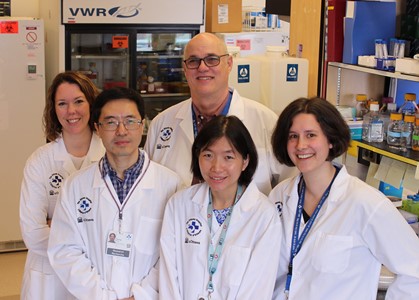Newsroom
Discovery provides “profound new insight” into Duchenne muscular dystrophy
April 19, 2018
 Researchers at The Ottawa Hospital and the University of Ottawa have discovered a completely new function for the protein complex containing the dystrophin protein, which is missing in people with Duchenne muscular dystrophy. Dr. Michael Rudnicki and his team found this complex brings two other proteins called p38gamma and Carm1 together in muscle stem cells, and this interaction establishes a genetic program that ultimately produces new muscle fibres. In laboratory models of Duchenne muscular dystrophy, this interaction never happens, so any new muscle fibres have a faulty genetic program.
Researchers at The Ottawa Hospital and the University of Ottawa have discovered a completely new function for the protein complex containing the dystrophin protein, which is missing in people with Duchenne muscular dystrophy. Dr. Michael Rudnicki and his team found this complex brings two other proteins called p38gamma and Carm1 together in muscle stem cells, and this interaction establishes a genetic program that ultimately produces new muscle fibres. In laboratory models of Duchenne muscular dystrophy, this interaction never happens, so any new muscle fibres have a faulty genetic program.
The new discovery is published in Cell Stem Cell. It builds on Dr. Rudnicki’s landmark discovery in 2015 showing that Duchenne muscular dystrophy directly affects muscle stem cells.
“This research represents a profound new insight into Duchenne muscular dystrophy and brings us another step closer to developing new treatments for this devastating disease,” said Dr. Rudnicki.
Duchenne muscular dystrophy is the most common form of muscular dystrophy, affecting approximately one in 3,600 boys. It weakens the muscles and causes death by the second or third decade of life.
Authors: Natasha C. Chang, Marie-Claude Sincennes, Fabien P. Chevalier, Caroline E. Brun, Melanie Lacaria, Jessica Segalés, Pura Muñoz-Cánovez, Hong Ming, Michael A. Rudnicki.
Acknowledgements: Dr. Rudnicki is a senior scientist and Director of the Regenerative Medicine Program and the Sprott Centre for Stem Cell Research at The Ottawa Hospital. He is also a professor at the University of Ottawa, Scientific Director of the Stem Cell Network and Canada Research Chair in Molecular Genetics. Dr. Rudnicki’s research is supported by generous donors to Regenerative Medicine at The Ottawa Hospital. This study was also supported by the U.S. National Institutes for Health, the Canadian Institutes of Health Research, the Muscular Dystrophy Association, Muscular Dystrophy Canada, the Stem Cell Network, the University of Ottawa Brain and Mind Research Institute, the Ontario Institute for Regenerative Medicine and the French Muscular Dystrophy Association.
The Ottawa Hospital: Inspired by research. Driven by compassion
The Ottawa Hospital is one of Canada’s largest learning and research hospitals with over 1,100 beds, approximately 12,000 staff and an annual budget of over $1.2 billion. Our focus on research and learning helps us develop new and innovative ways to treat patients and improve care. As a multi-campus hospital, affiliated with the University of Ottawa, we deliver specialized care to the Eastern Ontario region, but our techniques and research discoveries are adopted around the world. We engage the community at all levels to support our vision for better patient care. See www.ohri.ca for more information about research at The Ottawa Hospital.
University of Ottawa: —A crossroads of cultures and ideas
The University of Ottawa is home to over 50,000 students, faculty and staff, who live, work and study in both French and English. Our campus is a crossroads of cultures and ideas, where bold minds come together to inspire game-changing ideas. We are one of Canada’s top 10 research universities—our professors and researchers explore new approaches to today’s challenges. One of a handful of Canadian universities ranked among the top 200 in the world, we attract exceptional thinkers and welcome diverse perspectives from across the globe. www.uottawa.ca
Media Contact
Jennifer Ganton
Director, Communications and Public Relations
Ottawa Hospital Research Institute
Office: 613-798-5555 x 73325
Cell: 613-614-5253
jganton@ohri.ca
